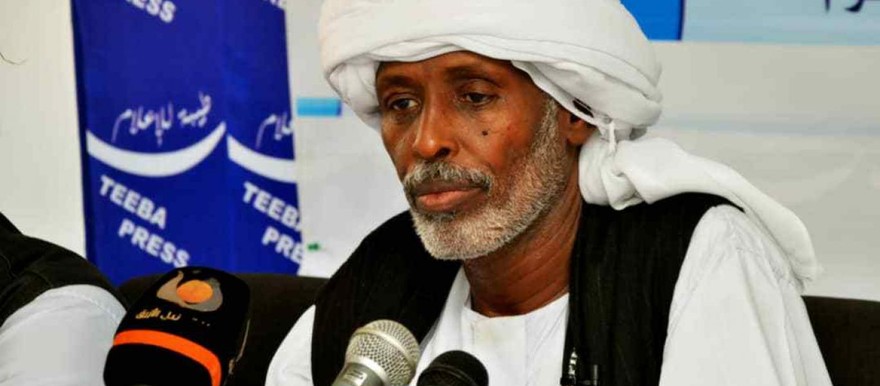Political analyst: ‘Eastern Sudan needs separate negotiations over governance’

Sayed Tirik, head of the mainstream High Council of Beja Nazirs and Independent Chieftains (social media)
KHARTOUM / KASSALA / PORT SUDAN / EL GEDAREF
Eastern Sudanese political analyst, Abu Fatima Onur, called for a separate negotiation platform to be established to work out the issue of eastern Sudan governance in an interview with Radio Dabanga. The head of the High Council of Beja Nazirs and Independent Chieftains, Sayed Tirik, has repeatedly called for such a platform.
This should only happen after a civilian government has been formed in Sudan, said Onur. He referred to the Juba Peace Agreement as an example, which came about after peace talks were held between the Sudanese government and a number of rebel movements under the auspices of the South Sudanese government in 2019 and 2020.
He recommended assigning political power to the region (Red Sea state, Kassala, and El Gedaref) during the transitional period “under a fully-fledged and operational federal system”.
“According to the principles of unified federalism,” levels of government should be similar in all regions of the country, he said. “Current disparities represented by regional governance for Darfur, autonomy for South Kordofan, and a distorted form of federalism for the rest of the states should be removed.”
The analyst called for restoring the borders of the eastern Sudan region to what they were before 1974 when President Jaafar Nimeiri annexed the Sidon administrative unit to northern Sudan.
In addition, “the depletion of eastern Sudanese mineral resources by River Nile state must be halted immediately,” and an Eastern Sudan Company for Mineral Resources should be established. “A fixed federal percentage of its revenues should be paid by the federal Ministry of Finance, as is already the case with the Maritime Ports Authority in Port Sudan,” said Onur.
Onur further urged “the opening of the eastern spillway at the Lake Setit (Seteet) reservoir, like the western spillway, to prevent the El Gash project from collapsing and the Kassala aquifer drying out. In addition, projects of the Infrastructure Reconstruction Fund, of which a significant percentage has been implemented in Red Sea state, Kassala, and El Gedaref, must be completed.”
Khartoum workshops
Currently, a series of dialogue workshops are being held in Khartoum, in which various stakeholders will decide on the fate of five critical issues to reach a consensus on the subjects. The outcomes will lead to a final agreement with the military junta on the upcoming transitional period and the competencies of a new civilian government of technocrats. This new government will be formed once the military has retreated from power and the Final Agreement has been signed.
This month, separate conferences, consisting of several workshops, will discuss justice and transitional justice, security and military reform, the removal of remnants of the empowerment* policies of ousted President Omar Al Bashir, amendments to the Juba Peace Agreement, and governance issues in eastern Sudan.
In his address to supporters in Kassala on January 1, Tirik again threatened to announce self-determination for eastern Sudan if the government does not respond to their demands for a separate platform and development in eastern Sudan. Tirik has refused to attend “workshops on the side-lines of conferences” about the marginalised eastern region.
An empowerment removal roadmap conference was held in Khartoum on Monday morning to initiate the renewal of the empowerment* removal process. A new Empowerment Removal Committee (ERC) will be formed in the future, but without members of the previous committee that was suspended after the 2021 military coup.
Khaled Omar Yousef, leading member of the Forces for Freedom and Change-Central Council (FFC-CC) which started the current political process together with other pro-democratic groups, said: “The outcomes of the conference should reflect the largest social base possible so that this process is characterised by inclusiveness and includes the opinions of the stakeholders.”
The workshops are being held at the Friendship Hall in Khartoum, not nationwide, as earlier announced. Displaced leaders in Darfur have called the workshops ‘elitist’.
* Empowerment (tamkin) is the term with which the ousted government of Omar Al Bashir supported its affiliates by granting them far-going privileges. In the end of 2019, the government of Abdallah Hamdok established the Empowerment Removal Committee (ERC) with the aim to purge the country of the remnants of the Al Bashir regime. The work of the ERC was suspended following the October 2021 coup d’état.











 and then
and then